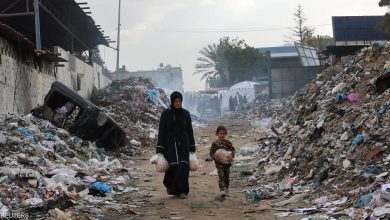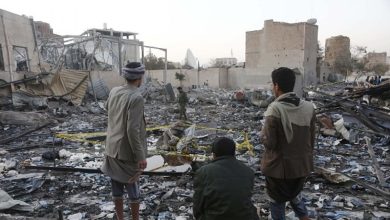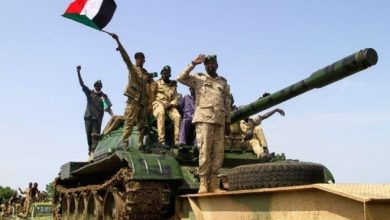Unraveling Israel’s Plot: Destabilizing Algeria and Accusations Directed at the UAE

Watan-Algeria accused “external parties” of “flooding” it with illegal immigrants, including Israel through the update of the “Kalighri” plan, which, according to analysts, is a French Zionist plan aimed at establishing military bases on the borders of African countries with Algeria and inciting conflicts and civil wars to justify Africans migrating to Algeria.
The issue of smuggling immigrants and the prevalent security problems and organized crime in the Sahel region represent the most prominent security challenges facing Algeria.
The situation worsened with the coups that occurred in the Sahel region, especially in Mali and Niger, which brought regimes that have been dealing unfriendly with Algeria recently. Algerians have also accused the United Arab Emirates in this regard.
Israeli plan to flood southern Algeria with immigrants
Statistics from international organizations monitoring the activities of these networks specialized in smuggling immigrants in Africa indicate that the revenues from smuggling operations exceed one billion dollars annually, sometimes surpassing the profits from drug trafficking.
In September last year, 2023, Algerian National Gendarmerie elements in Ain Temouchent in the west of the country dismantled an international criminal network specializing in organizing illegal migration trips by sea and arrested 11 people, 7 of whom were Moroccan nationals.
The Algerian news agency reported at the time, citing the National Gendarmerie, that the operation was successful due to the good use of information, enabling the regional unit of the National Gendarmerie in the municipality of El Hassas in Ain Temouchent to put an end to the activity of an international criminal network crossing borders.
Deliberate defamation of Algeria
According to Algerian journalist Ahmed Hafsi, the “Sahara Alarm Phone” organization in Niger recruits networks instigating various nationalities to collectively attempt to cross borders and enter Algerian territory, and confront security forces there.
Hafsi also pointed out the existence of suspicious websites and platforms fabricating certificates and videos alleging mistreatment of migrants from the Sahel and desert countries.
While the United Nations and the International Organization for Migration accuse Algeria of expelling 9,000 migrants to northern Niger, the Public Prosecution at the Judicial Council in Algeria denied these charges and confirmed that “waves of migrants coming from the Sahel region to Algeria are generally directed within the framework of an orchestrated plan devised by external parties to destabilize the country and embarrass it internationally.”
مخطط إسرائيلي لإغراق جنوب #الجزائر بالمهاجرين غير الشرعيين عبر تحديث خطة #كاليغري !
منظمة #هاتف_إنذار_الصحراء في #النيجر تجند شبكات تحرض مختلف الجنسيات على محاولة تجاوز الحدود جماعيا والولوج للأراضي الجزائرية والصدام مع الأجهزة الأمنية الجزائرية
مواقع ومنصات تفبرك شهادات… pic.twitter.com/2fysB9h3hC
— أحمد حفصي || HAFSI AHMED (@ahafsidz) May 11, 2024
Accusations against the UAE
Algerians have gone so far as to accuse the United Arab Emirates of participating in this scheme through its extended influence in Mali, Niger, and Sahel countries, especially after recent revelations of Abu Dhabi’s conspiracies against Algeria.
In this context, one Twitter user wrote: “The donkeys’ money – referring to the UAE – has started to appear from the south… flooding Algeria with drugs and immigrants was not accidental but deliberate and directed.”
Prominent Algerian politician Louiza Hanoune, leader of the leftist Workers’ Party, in January last year attacked the UAE following a meeting with President Abdelmadjid Tebboune, affirming a major crisis between Algeria and the Gulf state.
Hanoune stated at the time that “the UAE declared war on Algeria in service to the Zionist entity, flooding our country with drugs through Libya, inciting war between Algeria and Morocco, and seeking to isolate Algeria by pushing Mauritania and Tunisia towards normalization.”
The crisis between the UAE and Algeria has escalated to the point of reducing diplomatic representation between them recently, and bilateral relations between Abu Dhabi and Algeria are likely to escalate to the point of rupture due to what Algeria considers “insults and actions against its interests in various fields and regions.”
Principle of good neighborliness
In 2009, the Algerian Parliament approved a law criminalizing illegal migration, punishing offenders with imprisonment for more than 6 months, while those responsible for the network could face imprisonment for 5 years or more.
Algerian President Abdelmadjid Tebboune recently stated in response to tensions with Sahel countries that Algeria has never imposed itself on Mali and Niger and has been dealing with them since independence based on the “principle of good neighborliness.”
He emphasized that if the parties in Mali or Niger refuse today to cooperate with Algeria, they have every freedom to manage their affairs, reiterating that Algeria has never been a colonial or exploitative state of resources or countries “but deals on the basis that we are sister countries.”






